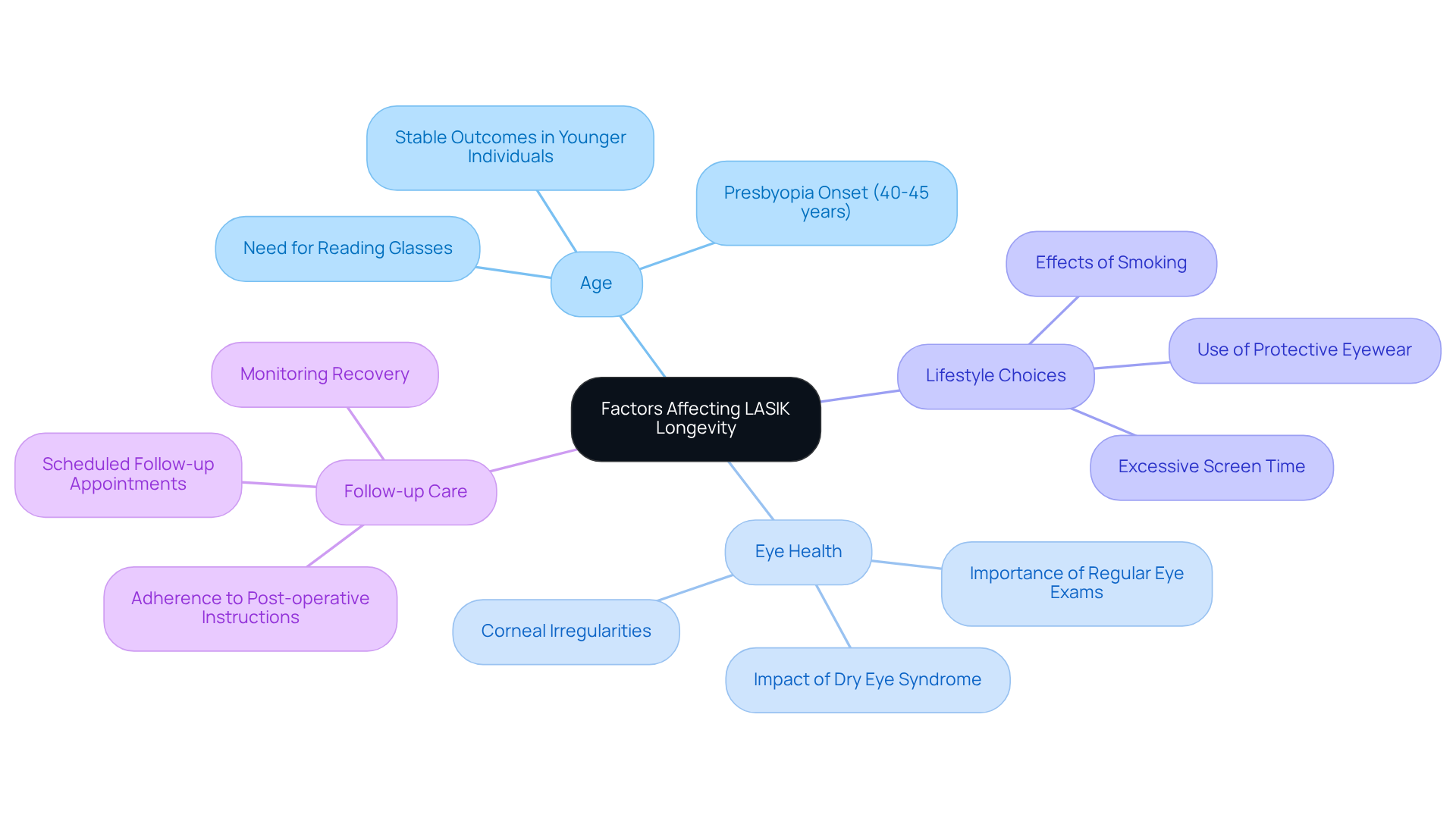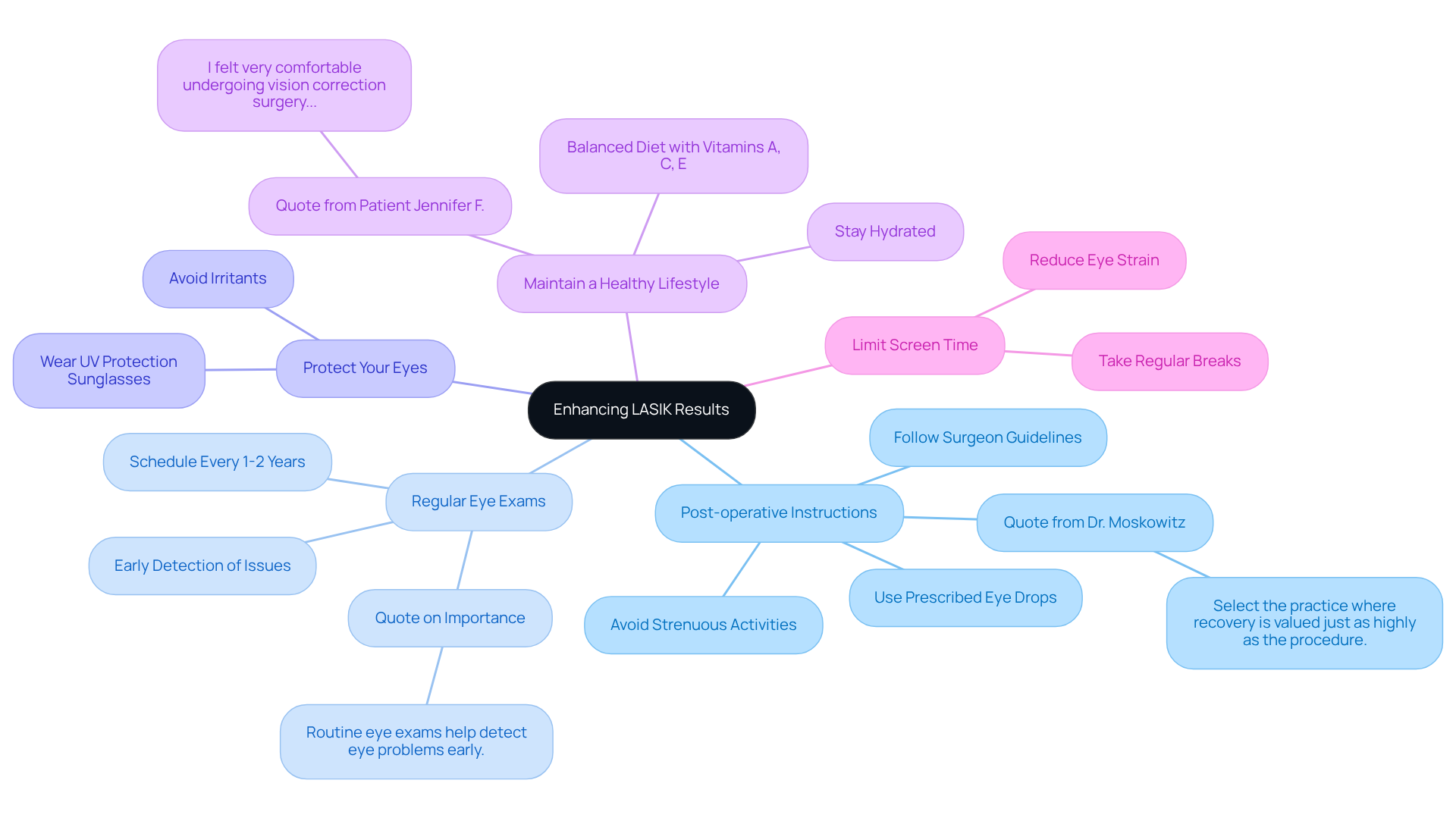Posted by: Northwest Eye in LASIK on October 31, 2025
Overview
LASIK eye surgery can offer you stable vision results for a remarkable 10 to 20 years. However, we understand that some patients may need enhancement procedures due to natural changes in their eyes over time.
It’s common to feel concerned about how long your results will last. Factors such as age, pre-existing eye conditions, and lifestyle choices play a significant role in the longevity of LASIK outcomes. Adhering to post-operative care is crucial, and we encourage you to prioritize regular eye exams and maintain a healthy lifestyle to help keep your vision clear.
Remember, you’re not alone in this journey. Many patients have found that taking proactive steps can make a real difference in their LASIK experience. We are here to help you through this process and support you in achieving the best possible results.
Introduction
Understanding the longevity of LASIK eye surgery is crucial for anyone considering this life-changing procedure. We understand that the prospect of clearer sight is exciting, especially with over 95% of patients achieving 20/40 vision or better. However, it’s common to feel concerned about how long these results will last. Various factors, from age to lifestyle choices, can significantly impact the durability of your vision.
What happens when the initial clarity begins to fade? It’s natural to wonder how you can ensure your vision remains sharp for years to come. This article delves into the intricacies of LASIK longevity, exploring essential factors that affect your results. We’ll also offer practical tips to help you maximize the benefits of this popular eye surgery, so you can feel confident in your decision.
Understand LASIK Surgery Basics
Laser-Assisted In Situ Keratomileusis, or LASIK, is a well-known refractive eye surgery designed to help with common vision issues like myopia (nearsightedness), hyperopia (farsightedness), and astigmatism. This procedure reshapes the cornea using a laser, improving how light focuses on the retina. We understand that considering eye surgery can be a big step, so here’s a brief overview of what to expect during the LASIK process:
-
Pre-operative Evaluation: First, a thorough eye examination is crucial to determine if LASIK is right for you. This assessment checks your corneal thickness, refractive error, and overall eye health, ensuring you meet the criteria for a successful outcome.
-
Surgery Day: On the day of your procedure, numbing eye drops will be applied, and a device will gently hold your eyelids open. A thin flap is created on the cornea, which is then lifted to allow the laser to reshape the underlying tissue.
-
Laser Treatment: The laser is carefully applied to the cornea to correct your refractive error. Once the treatment is complete, the flap is repositioned, starting the healing process.
-
Recovery: Most people notice improved vision within a day or two, although full stabilization can take several weeks. It’s common to feel some discomfort initially, but this usually fades quickly. Many individuals can return to their normal activities within 24-48 hours. However, some may experience temporary blurred vision during recovery, which can be caused by the healing process or other underlying conditions. It’s important to monitor any changes in your eyesight after surgery.
Recent advancements in eye surgery technology, like the Pentacam HR, have greatly improved safety and effectiveness. In fact, over 95% of individuals who undergo LASIK achieve 20/40 vision or better, with about 85-90% reaching 20/20 vision. Plus, satisfaction rates exceed 95%, showcasing the procedure’s reliability. Choosing a skilled surgeon is essential for enhancing success rates and ensuring a safe experience.
Understanding these basics prepares you for a deeper conversation about how long does LASIK eye surgery last and the long-term effects, including the factors that can influence them, such as potential temporary side effects like blurred vision and light sensitivity. Additionally, financing options, such as 0% interest plans, can help manage the costs associated with laser eye surgery. Remember, we are here to help you through this process.

Identify Factors Affecting LASIK Longevity
Several factors can significantly influence how long LASIK eye surgery lasts, and we understand that this can be a source of concern for many.
-
Age: Younger individuals generally experience more stable outcomes. However, as we age, we may encounter vision changes, such as presbyopia, which often begins around age 40-45. This condition can make it harder to focus on close objects. It’s important to remember that LASIK doesn’t prevent these age-related changes, and many patients may still find themselves needing reading glasses as they get older.
-
Eye Health: Pre-existing conditions like dry eye syndrome and corneal irregularities can impact both the effectiveness and durability of LASIK results. Dry eye syndrome, in particular, can lead to blurred vision and discomfort. Regular eye examinations are essential for monitoring these conditions and ensuring optimal eye health.
-
Lifestyle Choices: Habits such as smoking, excessive screen time, and not using protective eyewear can contribute to eye strain and a gradual decline in vision. Embracing a healthier lifestyle can help prolong the benefits of corrective eye surgery and alleviate symptoms of blurred sight.
-
Follow-up Care: Following post-operative care instructions and attending scheduled follow-up appointments are crucial for monitoring recovery and addressing any emerging issues. This proactive approach can greatly enhance the duration of your results and help manage any potential complications, including those related to blurred vision.
By recognizing these factors, such as the possibility of slight vision changes over time due to natural aging and the effects of conditions like dry eye syndrome, you can take proactive steps to protect your eye health, including understanding how long LASIK eye surgery lasts. This will help you enjoy the lasting benefits of refractive surgery. If you’re considering laser eye surgery, completing a self-suitability quiz can also be a helpful way to evaluate your qualifications for the procedure. We are here to help you through this process.

Explore Common Questions About LASIK Duration
Here are some common questions regarding the duration of LASIK results:
-
How long does the procedure last? Most patients are curious about how long LASIK eye surgery lasts, as they experience stable vision for 10 to 20 years after the procedure. However, it’s common for some to need improvement procedures, which raises the question of how long LASIK eye surgery lasts. The enhancement rates for laser vision correction technology are about 1 to 2% in the first 12 months, as our eyes naturally change over time.
-
Will I require glasses after the eye surgery? While around 96% to 98% of patients who undergo the procedure achieve 20/20 sight or better, some individuals may still need glasses for specific activities, especially as they age and conditions like presbyopia develop.
-
What if my sight changes after LASIK? Changes in vision can occur due to natural aging or other eye conditions. Regular eye exams are essential for early detection and management of these changes, particularly for patients with conditions like diabetes that may affect vision longevity.
-
Is the eye surgery permanent? The procedure permanently reshapes the cornea, leading to the question of how long LASIK eye surgery lasts in providing lasting correction for refractive errors. However, it doesn’t prevent age-related vision changes, so it’s important to be prepared for possible alterations in sight over time. As eye care professionals often say, “The surgery is a permanent procedure that irreversibly alters the shape of your cornea.”
By addressing these questions, we hope you feel more informed and assured in your choice to undergo eye surgery. Remember, we are here to help you through this process.

Implement Strategies to Enhance LASIK Results
To help you maximize the longevity of your LASIK results, we understand that implementing a few thoughtful strategies can make a significant difference:
-
Follow Post-operative Instructions: It’s crucial to adhere strictly to your surgeon’s post-operative care guidelines. This includes using prescribed eye drops and avoiding strenuous activities. Dr. Craig Moskowitz emphasizes, “If you’re contemplating sight correction, select the practice where recovery is valued just as highly as the procedure.” Effective post-operative care plays a vital role in your recovery and overall satisfaction.
-
Regular Eye Exams: We encourage you to arrange consistent check-ups with your eye care provider to assess your sight and eye health. Even if you achieve perfect eyesight, thorough eye examinations are essential for the early identification of any potential issues. It’s recommended to have these exams at least every one to two years post-LASIK to ensure your long-term eye health.
-
Protect Your Eyes: Remember to wear sunglasses with UV protection when outdoors and avoid exposure to irritants like smoke or dust. Protecting your eyes from environmental factors can help prevent discomfort and maintain optimal vision.
-
Maintain a Healthy Lifestyle: A balanced diet rich in vitamins A, C, and E, along with omega-3 fatty acids, is beneficial. Staying hydrated is equally important. A healthy lifestyle not only promotes overall eye wellness but can also enhance the benefits of your eye surgery. As patient Jennifer F. shared, “I felt very comfortable undergoing vision correction surgery and would do it again and will recommend it 1,000 times!”
-
Limit Screen Time: It’s common to feel eye strain from prolonged screen use. Taking regular breaks can help reduce discomfort and maintain your sight over time.
By embracing these strategies, you can help ensure that your LASIK results remain effective for as long as possible, which relates to how long does LASIK eye surgery last, ultimately enhancing both your quality of life and vision clarity. We are here to support you through this journey.

Conclusion
Understanding the longevity of LASIK eye surgery is essential for anyone considering this important procedure. We know that LASIK offers a promising solution for refractive errors, allowing many individuals to enjoy clear vision without relying on glasses or contact lenses. However, it’s common to wonder how long these results will last, as the duration can vary based on several factors, including age, eye health, lifestyle choices, and adherence to post-operative care.
Throughout this article, we’ve shared key insights about the LASIK process, covering the pre-operative evaluation, the surgical procedure itself, and the recovery phase. It’s important to remember that while LASIK can lead to long-lasting vision correction, factors such as natural aging and pre-existing eye conditions can influence outcomes. To maximize the benefits of LASIK, proactive measures like regular eye exams, protective eye care, and maintaining a healthy lifestyle are essential.
Ultimately, the journey to optimal vision doesn’t end with the procedure. By taking an active role in your eye health and following recommended guidelines, you can enhance the longevity of your LASIK results. Embracing these strategies not only improves your quality of life but also helps safeguard against potential vision changes over time. For those considering LASIK, being informed and prepared is key to achieving and maintaining the best possible outcomes. We are here to help you through this process.
Frequently Asked Questions
What is LASIK surgery?
LASIK (Laser-Assisted In Situ Keratomileusis) is a refractive eye surgery designed to correct common vision issues such as myopia (nearsightedness), hyperopia (farsightedness), and astigmatism by reshaping the cornea with a laser.
What is involved in the pre-operative evaluation for LASIK?
The pre-operative evaluation includes a thorough eye examination to assess corneal thickness, refractive error, and overall eye health to determine if LASIK is suitable for the patient.
What happens on the day of the LASIK surgery?
On surgery day, numbing eye drops are applied, a device holds the eyelids open, and a thin flap is created on the cornea. This flap is lifted to allow the laser to reshape the underlying tissue.
How is the laser treatment performed during LASIK?
The laser is applied to the cornea to correct the refractive error, after which the flap is repositioned to initiate the healing process.
What is the recovery process like after LASIK surgery?
Most people notice improved vision within a day or two, though full stabilization can take several weeks. Initial discomfort is common but usually fades quickly, and many individuals can resume normal activities within 24-48 hours.
Are there any potential side effects during recovery from LASIK?
Yes, some patients may experience temporary blurred vision and light sensitivity during recovery, which can be due to the healing process or other underlying conditions.
What are the success rates for LASIK surgery?
Over 95% of individuals who undergo LASIK achieve 20/40 vision or better, with about 85-90% reaching 20/20 vision, and satisfaction rates exceed 95%.
How can I manage the costs associated with LASIK surgery?
Financing options, such as 0% interest plans, are available to help manage the costs associated with laser eye surgery.
Why is it important to choose a skilled surgeon for LASIK?
Choosing a skilled surgeon is essential for enhancing the success rates of the procedure and ensuring a safe surgical experience.






